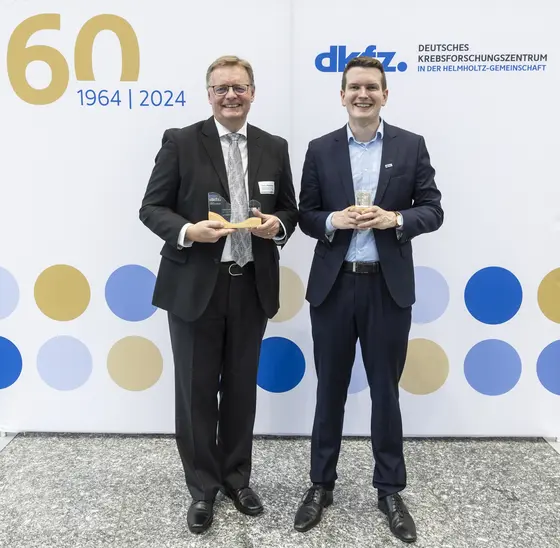This year, the jury awarded the DKFZ Innovation Award to Titus Brinker. The dermatologist, cancer researcher and AI expert receives the award, which is endowed with 25,000 euros, for the development of an AI-supported dermatoscope for the early detection of malignant skin lesions. The dermatoscope may soon find its way into doctors' surgeries and help to detect malignant skin changes earlier and more reliably.
Ursula Weyrich, Administrative Director of the DKFZ, said at the award ceremony: “Titus Brinker's AI-assisted dermatoscope is an excellent example of successful translation. We encourage all scientists at the DKFZ to examine their results for potential commercial applicability and support them in their transfer strategy. In this way, scientific progress can quickly benefit patients.“
The development of the dermatoscope had been preceded by a long phase of translational research since 2018. First, Brinker and his colleagues in the sKin research project had to train the artificial intelligence to reliably distinguish malignant melanomas from harmless moles - in strict compliance with all data protection regulations. This worked so well that the AI system performed better than experienced dermatologists in a systematic test when assessing skin lesions.
At the same time, Brinker and his team conducted a survey of both patients and dermatologists to ascertain their willingness to rely on the results of AI diagnostics. For the first time in dermatology, Brinker's AI-based support system explains its decisions. It uses established diagnostic features that relate to specific areas of suspicious lesions. The explanations increased the doctors' confidence in the machine's decisions - as well as in their own diagnoses. A comprehensive prospective study is about to be published, with which the researchers will prove the superiority of AI-supported diagnostics.
Since January 2024, the Baden-Württemberg Ministry of Social Affairs, Health and Integration has been supporting a study to approve a dermatoscope in which Brinker's AI system is already integrated in accordance with the EU Medical Devices Regulation. The device was developed in collaboration with the company Heise Optotechnik and hardly differs from a conventional dermatoscope in its application.
“Depending on where they live, not everyone in Germany has quick access to an experienced dermatologist,“ says prizewinner Titus Brinker. “With the AI-assisted dermatoscope, we want to support general practitioners or younger dermatologists in making safe and reliable diagnoses. And even experienced specialists can increase their diagnostic accuracy even further with our system. This success is not an individual achievement, but an award for the entire team involved in the development.“
The DKFZ Patient Expert Award was presented for the first time at the DKFZ Annual Reception. This award is intended to recognize patient representatives who have made an outstanding contribution to cancer research in Germany.
The prize, endowed with 5000 euros, went to Markus Wartenberg, the spokesman of the Patient Research Council of the National Center for Tumor Diseases (NCT). Wartenberg was already actively involved in developing the strategy for the expansion of the NCT from two to six sites. “Markus Wartenberg supports the integration of patient participation in the expanded NCT with extraordinary commitment,“ emphasized Michael Baumann, Chairman of the Board of the DKFZ, when presenting the award.
Wartenberg, who has been active as a patient representative both nationally and internationally for over 20 years, was also a key initiator of the Patient Expert Academy (PEAK) and the National Conference “Patients as Partners in Cancer Research“. Markus Wartenberg has also been particularly committed to patient involvement in sarcoma research.



